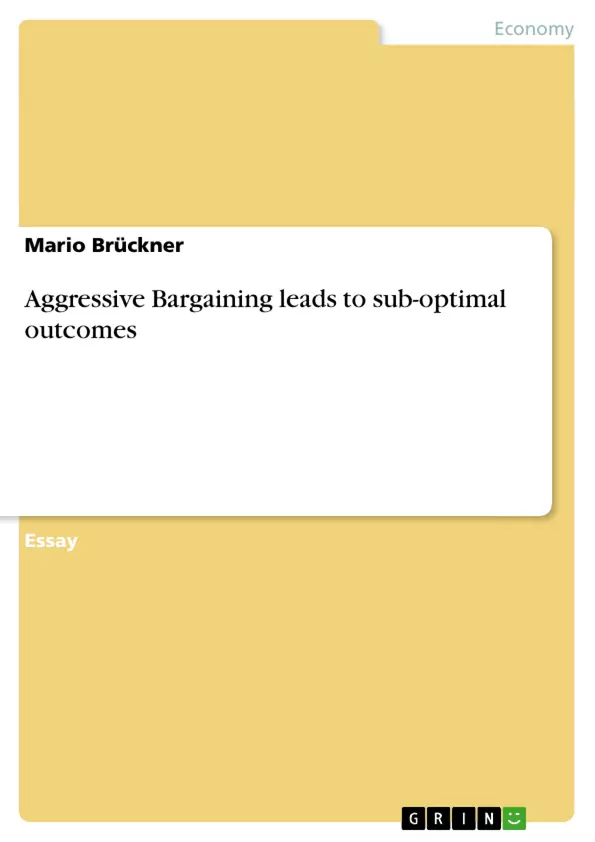As the individual economies of the European Union member countries become increasingly integrated, sharing factors of production such as capital, labour, and technology, international trade is expected to continue to increase. For the purpose of this paper, I have chosen to analyse the international trade under the perspective of Aggressive Bargaining. The result will be that Aggressive Bargaining leads to a sub-optimal outcome.
Inhaltsverzeichnis (Table of Contents)
- Introduction
- Game Theory
- International trade
- Mercantilism
- Smith and Ricardo
- Aggressive Bargaining
- Solutions
- Sources
Zielsetzung und Themenschwerpunkte (Objectives and Key Themes)
This paper examines the impact of aggressive bargaining on international trade within the framework of game theory. The goal is to demonstrate that aggressive bargaining leads to suboptimal outcomes, hindering the potential benefits of free trade.
- Game Theory and its application to international trade
- The Prisoner's Dilemma and its relevance to trade strategies
- The impact of aggressive bargaining on Pareto optimality
- The potential for sub-optimal outcomes in asymmetric trade scenarios
- The role of international institutions like the WTO and the EU in mitigating the effects of aggressive bargaining
Zusammenfassung der Kapitel (Chapter Summaries)
- Introduction: Introduces the topic of aggressive bargaining in international trade, focusing on the increasing integration of European economies and the resulting growth of international trade.
- Game Theory: Explains the core concepts of game theory, emphasizing its applicability to the analysis of international trade interactions.
- International Trade: Discusses the historical evolution of trade theories, highlighting the contrast between Mercantilism's zero-sum perspective and the positive-sum approach championed by Smith and Ricardo. It then introduces the concept of aggressive bargaining as a trade strategy, demonstrating its impact on outcomes using the Prisoner's Dilemma model.
Schlüsselwörter (Keywords)
Game theory, international trade, aggressive bargaining, Prisoner's Dilemma, Pareto optimality, sub-optimal outcomes, WTO, European Union, trade strategies, tariffs, protectionism, free trade.
Frequently Asked Questions
What is aggressive bargaining in international trade?
Aggressive bargaining refers to trade strategies where a country prioritizes its own gains through pressure or protectionism, often leading to conflict with trading partners.
How does the Prisoner's Dilemma apply to trade?
In trade, it shows that if both countries act purely in their self-interest (e.g., by imposing tariffs), they both end up worse off than if they had cooperated through free trade.
What is a sub-optimal outcome in this context?
A sub-optimal outcome occurs when the chosen trade strategy prevents the participants from reaching a state where everyone is better off (Pareto optimality).
What role do the WTO and EU play?
These institutions help mitigate aggressive bargaining by establishing rules, encouraging cooperation, and providing a framework for resolving trade disputes.
How does aggressive bargaining contrast with Ricardo's theories?
While Ricardo championed the positive-sum approach of free trade where all benefit, aggressive bargaining often reverts to a mercantilist, zero-sum perspective.
- Quote paper
- Mario Brückner (Author), 2003, Aggressive Bargaining leads to sub-optimal outcomes, Munich, GRIN Verlag, https://www.grin.com/document/30071



